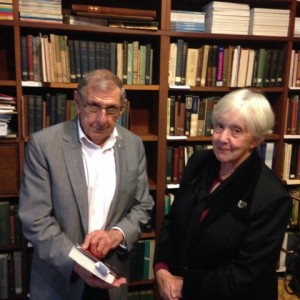Comrade Ambassador: Whitlam's Beijing envoy
On 4 November Professor Stephen Fitzgerald and Professor Jocelyn Chey discussed Stephen’s recently-launched autobiography, Comrade Ambassador, and reflected on their experiences over more than 40 years of Australia’s involvement with Asia.
Stephen spoke of his life as an External Affairs trainee studying Mandarin in Hong Kong in the early 1960s. Jocelyn had taken up a Commonwealth scholarship to study Chinese there, and they became friends. British expatriates had little contact with the local population and maintained a starchy lifestyle. There was a rift in the Chinese community between those oriented to Beijing and those favourable to Taiwan.
Australia under Menzies had not recognised the communist government which had come to power in Beijing in 1949, though he had at first been inclined to follow Britain in accepting the new reality. He refused to have formal relations with Taiwan because of his repugnance for the venal Chiang Kai-shek regime; that step was only taken later by Harold Holt. Non-recognition of Beijing reflected US pressure, and was consolidated when Chinese troops crossed into Korea during the Korean war.
Jocelyn commented that Australia’s tendency to follow and accommodate US policy had been a recurring theme in Australia’s approach to China. But the bamboo curtain had been reinforced by the unrest of the Cultural Revolution and China’s increasing reputation for dictatorship and human rights abuses. Stephen noted that diplomatic recognition should not be regarded as a compliment, but rather as pragmatism – it was a fantasy to pretend the government in Taipei was the government of China. But recognition would have been a bold move against the background of the Vietnam War, which was seen as a fight against China.
In Australia, the anti-Vietnam War protest movement had initially focused on perceived US imperialism more than on issues particular to Vietnam, but in time it had prompted curiosity about Vietnam itself and Asia more widely. Asian scholars had begun to re-assess their approach: they moved beyond regarding Asians as mere objects, stealing their antiques and beheading their Buddhas.
Stephen had returned to diplomacy at the age of 34, after embarking on an academic career, as prime minister Whitlam’s choice to be our first ambassador to communist China. Recognition had been opposed by senior foreign affairs officers and other public servants, and the new embassy was subverted by the bureaucracy at home. Staff were young but dedicated and well-qualified – such as Jocelyn, whom he had recruited as Cultural Counsellor – and their reporting came to be highly regarded by allies with whom it was shared, including US officials.
Jocelyn spoke of continuing developments in the relationship in the 1980s, particularly the establishment of the Australia-China Council, but noted the setback resulting from the Tiananmen Square massacre of 1989.
Stephen deplored the lack of coherence toward China under the Abbott government. It had flip-flopped over membership of the Asian Infrastructure Investment Bank. He asked why China was not included in the Trans Pacific Partnership negotiations. Prime Minster Turnbull had been encouraging some of his ministers to explore their “inner revolutionary”: perhaps things would improve now.
Stephen and Jocelyn had commented in an earlier discussion with the AIIA interns on the decline, beginning with the Howard government, of Australian interest in Asia. Funding for relevant education (including language training) had been eroded, and racism towards Asian and other communities within Australia had not been combated. This had reduced our capacity for informed, mutually-respectful relationships in Asia.
In his final comments, Stephen called for Australian foreign policy assessments and decisions to be more independent, undistorted by a US prism.
Report by Ian Lincoln
